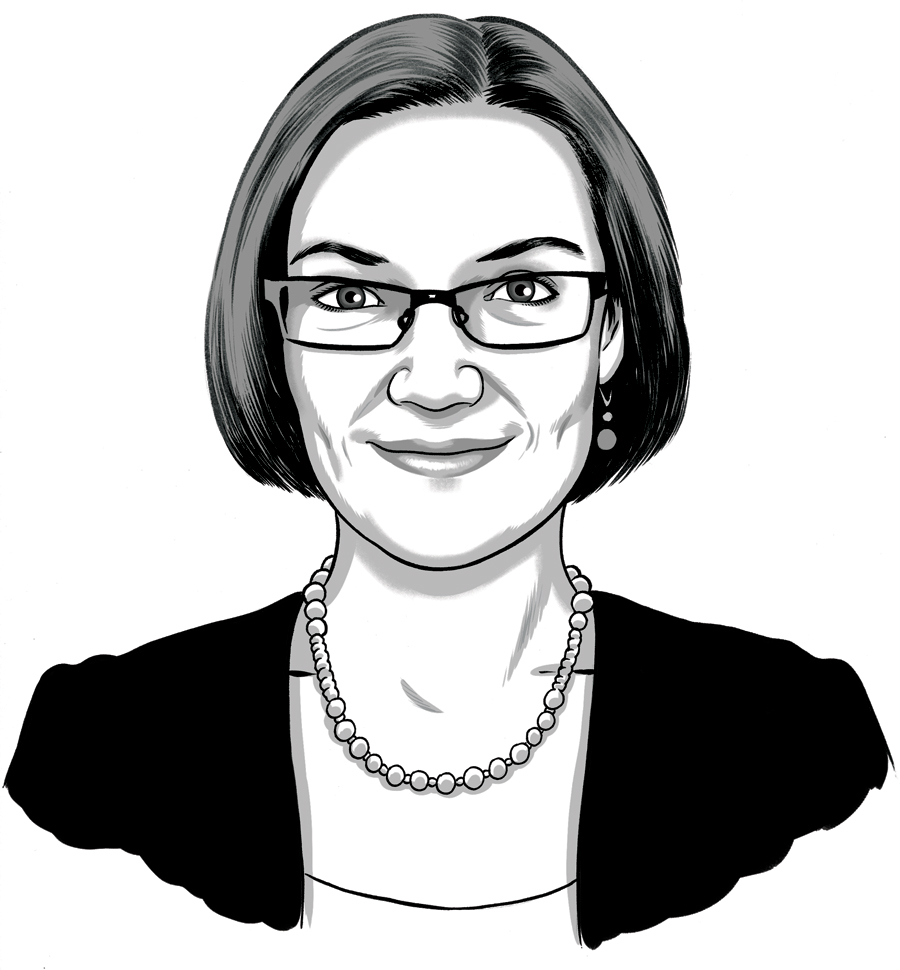

Illustration: Joel Kimmel
Erica Staehling ’07
A Perfect Storm
by Benjamin Gleisser
When a self-proclaimed “math nerd” marries a hurricane expert, you might expect a powerful partnership. Erica Staehling ’07 and husband Ryan Truchelut have exceeded expectations with their meteorological consulting firm, WeatherTiger, which produces seasonal weather forecasts and decision support for businesses with weather risk.
Q: Are the devastating hurricanes we’ve been seeing the result of climate change?
We can’t say for sure. By definition, extreme events are rare, and so it takes many years of data and sophisticated statistical methods to be able to draw conclusions. Unfortunately, the reliable record of hurricane climatology is too short to say definitively — we only have complete open-ocean data since the satellite era began in 1966. With only 50 years of data, it’s difficult to tease apart overall trends from the impacts of the natural climate variability that we know influences hurricane activity. We expect an increase in the maximum potential intensity of hurricanes due to ocean warming, but it’s unclear whether this is already detectable.
Q: How can we prepare for hurricanes?
Have a plan in place, trust the National Hurricane Center’s assessment of the situation, and listen to local emergency-response officials when it comes to evacuation orders. It’s important to have a plan, know if you live in an evacuation area and keep your disaster supply kit up-to-date.
Q: How reliable is THE FARMERS’ ALMANAC, which bases its weather predictions on sun spots?
While entertaining, The Farmers’ Almanac is not a reliable source for weather predictions. Sun spots do affect weather and climate, but internal climate modes like the El Nino-Southern Oscillation are much more important when predicting seasonal weather.
Q: Who uses WeatherTiger’s services?
We produce customized seasonal weather forecasts for USA Today, International Agribusiness Group [an independent consultancy] and a range of smaller companies, including solar-energy farms, insurance/reinsurance firms and the retail industry.
Q: Can you give me some examples of how it’s used?
Manufacturers need to know when and where to ship road salt in preparation for winter events. Grocery stores need to know when blizzards or hurricanes are coming [in order] to stock emergency supplies. Cereal and pasta companies need to know when the market is favorable to make bulk grain purchases.
Q: Can brokers use your information when playing the stock market?
Yes. Weather can play a dominant role in the futures markets, as drought, heat waves and unseasonable cold snaps can make or break a growing season for a particular crop. Markets tend to move based on global climate models with a two-week lead time, but our six-month seasonal models provide an edge on knowing what is to come. For instance, there was a major drought in Iowa last summer that threatened corn crops. Global models were keeping the rain just north of Iowa, which would have had a major impact on corn yield for the year, and the market began to rise. We forecast that Iowa would be a little wetter than those models indicated. Without our guidance, brokers would have lost a lot of money when corn prices didn’t soar.
Q: Why do you find weather fascinating?
I’ve always been a bit of a math nerd, and I entered Bucknell as a math major. I added physics as a second major, because I found applied math fascinating, and eventually got hooked on fluid dynamics. Being part of the Environmental Residential College encouraged me to seek real-world applications for what I was studying, and that eventually took the form of developing algorithms to improve weather predictive technology.
Q: Can WeatherTiger predict earthquakes?
Nope, and neither can anyone else!
Staehling, a summa cum laude physics and mathematics graduate, received American Meteorological Society and National Defense Science and Engineering graduate fellowships to study atmospheric and oceanic sciences at Princeton University, where she met her husband and earned her Ph.D.